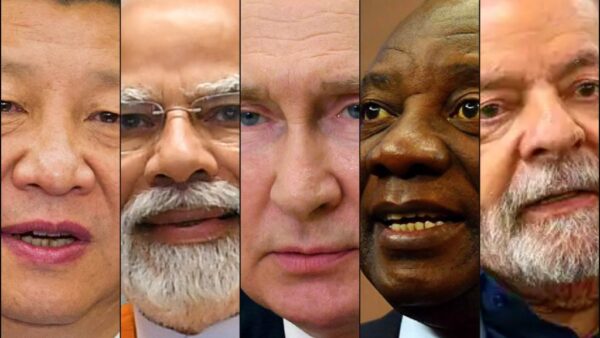
From August 22nd to 24th, Johannesburg, South Africa, will become the center of the multipolar world, as the most relevant emerging economies of the planet – Brazil, Russia, India, China and South Africa – gather to hold its 15th summit.
The BRICS group arrive at this new high-level meeting flexing its political and economic muscle, fielding dozens of applications from hopeful countries, and developing its economic structures to attempt a de-dollarization of the world’s economy.
Reuters reported:
“South African President Cyril Ramaphosa, Chinese President Xi Jinping, Brazil’s President Luiz Inacio Lula da Silva and Indian Prime Minister Narendra Modi are expected to attend.
Russian President Vladimir Putin will not attend in person due to an arrest warrant issued by the International Criminal Court for alleged war crimes in Ukraine. Putin will participate in the summit virtually and will be represented in Johannesburg by Foreign Minister Sergei Lavrov.”
In the last few months, the main issues on the BRICS agenda have been widely discussed, both between officials and in the media.
The most expressive development of this new BRICS moment is probably the question of the BRICS expansion.
Diverse estimates in the media put the number anywhere between 20 to 40 countries seeking membership in the club, in a context where representatives of more than 60 countries of the ‘Global South’ will attend.
BRICS leaders are divided over the expansion of the bloc. China is the main proponent of the BRICS expansion, while Brazil is skeptical and internally divided over it. Russia, fighting diplomatic isolation by the West, wants to bring in new members, as does South Africa – but India is undecided.
Another hot issue on the table is the New Development Bank (NDB), the so-called ‘BRICS bank’. Established in 2015, it is studying the use of alternative currencies in the trade among its members, de-dollarization, but there are no programmed discussions about a much-speculated about ‘common BRICS currency’ during the summit.
But apart from the shining new agendas, BRICS is about improving the economic ties between the diverse economies of the group, and developing trade and investment opportunities.
What exactly will be discussed in the three days of the Summit? Sputnik Africa:
“According to Anil Sooklal, South Africa’s BRICS sherpa, the first day of the summit will be devoted to a business forum, with heads of state addressing participants at the final session in the evening. The agenda of the second day will reportedly include a closed discussion of geopolitics, security issues, finance, and economics and an open session with representatives of the Business Council, the Women’s Business Alliance, and the BRICS New Development Bank.”
Again, Reuters:
“The last day of the summit is expected to focus on talks with leaders from other countries. Invitations to attend the summit were extended to 67 leaders across Africa, Latin America, Asia and the Caribbean, South African Foreign Minister Naledi Pandor said.
France had expressed interest in President Emmanuel Macron joining the summit, but Russia was opposed to this because of French support for Ukraine against the Russian invasion. Macron was not invited.”
20 dignitaries from different international organizations, including the United Nations, are also invited.
Again, Sputnik Africa:
“‘This summit, even before it took place, is a success since there are a huge number of countries that want to join the BRICS’, Akram Kharief, founder of the military information site Menadefense, said.”
Ashraf Patel, from the South African foreign policy think tank, the ‘Institute for Global Dialogue’:
“The need for a multipolar world order is a key demand from nations of the Global South. G20 and BRICS are leading in this regard. […] BRICS programs such as the New Development Bank NDP provides a new model of development finance, and new members are accessing these funds. This is a game changer. The new BRICS currency model, starting at a regional level, can open a new trade system that is cheaper and linked to commodity trade and remove expensive trade finance costs by international banks.

While the club was predicated on creating synergy between the interests of the world’s leading emerging economies, lately it has started to take more and more of a political aspect, which understandably makes many in the west ambivalent about it.
Just take a look at how the Associated Press reported it:
“The BRICS summit is the first to be held in person since 2019 and comes as the bloc seeks new relevance amidst Russia’s war in Ukraine, South Africa’s crashing economy and sharpening competition between Asian giants China and India.”
Meanwhile, Chinese-backed BRICS bank is funding infrastructure projects in Brazil and elsewhere in the developing world, as the Asian giant makes a big bet on the group’s relevance.
“Asked at a daily briefing about China’s expectations for the summit, Foreign Ministry spokesperson Wang Wenbin said BRICS had been ‘taking on increasing international influence’, but did not mention the issue of expansion. He said China looks forward to working with South Africa to ‘jointly pursue development and revitalization and make a positive contribution to a multipolar world and greater democracy in international relations’.
‘All sides will have an in-depth exchange of views on prominent global challenges, enhance coordination and cooperation in international affairs, and inject stability and positive energy into today’s world’, Wang said.”
Read more here:
The post BRICS SUMMIT: Scenes From a Multipolar World – Economic Synergy and Political Defiance in Three Days of Meetings Starting Tuesday appeared first on The Gateway Pundit.